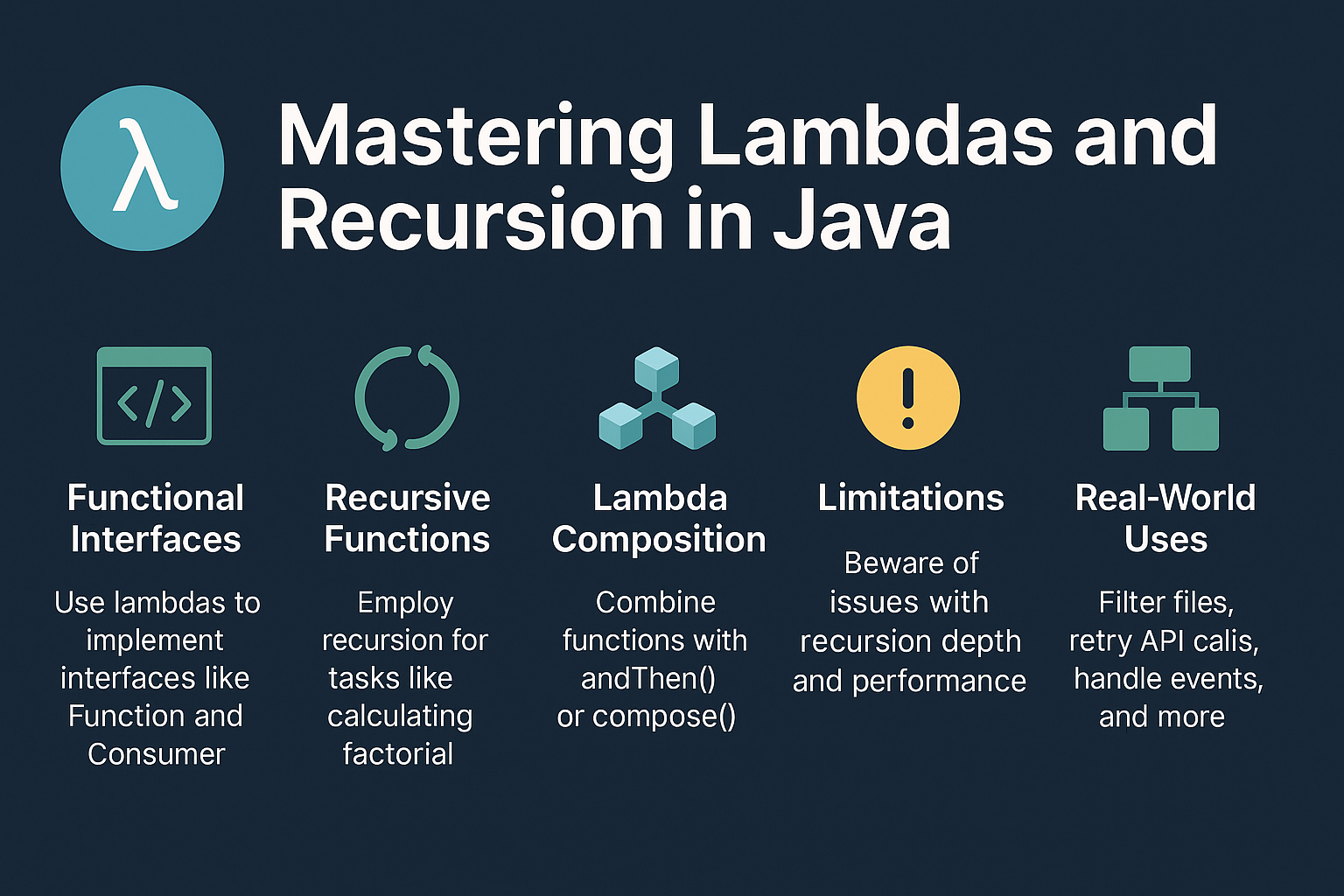Java's evolution into functional programming began with the introduction of lambda expressions in Java 8. These compact, expressive constructs have revolutionized how we write asynchronous, event-driven, and cleaner code. When combined with recursion, Java offers powerful ways to solve complex problems—sometimes elegantly, sometimes with caution.
This tutorial explores lambda expressions and recursion together—their syntax, use cases, limitations, and how they coexist in modern Java development. Whether you’re a seasoned developer or just stepping into Java’s functional world, this guide covers theory, hands-on examples, performance tips, and best practices.
🚀 Introduction: Why Lambdas and Recursion Matter
Imagine an assembly line. Each station performs a task and hands off work to the next—like chained lambda functions. Now, imagine a system that calls itself repeatedly until the task is complete—that’s recursion. Both are tools of abstraction and composition, simplifying complex logic.
In Java:
- Lambdas offer concise syntax for implementing functional interfaces.
- Recursion breaks problems into smaller, repeatable subproblems.
- Together, they form a cornerstone of functional programming, aiding immutability, parallelism, and cleaner APIs.
🔍 Understanding Lambda Expressions
What Is a Lambda in Java?
A lambda expression is an anonymous function (i.e., without a name) that implements a functional interface (an interface with a single abstract method).
// Traditional anonymous class
Runnable r1 = new Runnable() {
public void run() {
System.out.println("Running...");
}
};
// Equivalent lambda
Runnable r2 = () -> System.out.println("Running...");
Syntax Overview
(parameters) -> expression
(parameters) -> { statements }
Functional Interfaces in java.util.function
| Interface | Parameters | Returns | Use Case |
|---|---|---|---|
Function<T, R> |
1 | Yes | Transforming input |
Consumer<T> |
1 | No | Performing side-effects |
Supplier<T> |
0 | Yes | Supplying values |
Predicate<T> |
1 | Boolean | Filtering and matching |
🔁 What Is Recursion?
Recursion is when a method calls itself to solve smaller instances of a problem until it reaches a base case.
Example: Factorial with Recursion
int factorial(int n) {
if (n <= 1) return 1;
return n * factorial(n - 1);
}
While this looks elegant, it can be inefficient or error-prone if not handled properly—especially with deep recursion.
⚡ Lambdas and Recursion Together: Can They Work?
Yes, but with workarounds. Java lambdas can’t directly reference themselves due to scoping rules. However, we can use functional interfaces cleverly.
Recursive Lambda Example (with helper)
Function<Integer, Integer> factorial = new Function<>() {
public Integer apply(Integer n) {
return n <= 1 ? 1 : n * this.apply(n - 1);
}
};
System.out.println(factorial.apply(5)); // Output: 120
Or, better yet, using higher-order functions:
UnaryOperator<UnaryOperator<Integer>> factorialGen = f -> n -> n <= 1 ? 1 : n * f.apply(f).apply(n - 1);
UnaryOperator<Integer> factorial = factorialGen.apply(factorialGen);
🔗 Lambda Composition: andThen() and compose()
Example: Composing Functions
Function<Integer, Integer> times2 = x -> x * 2;
Function<Integer, Integer> square = x -> x * x;
Function<Integer, Integer> composed = times2.andThen(square);
System.out.println(composed.apply(3)); // (3 * 2)^2 = 36
Use .compose() to reverse the order.
⚠️ Limitations and Gotchas
- Checked Exceptions: Lambdas can’t throw checked exceptions unless handled explicitly.
- Recursion Depth: Deep recursive calls in lambdas can still cause StackOverflowError.
- Performance: Excessive lambda chaining or boxing/unboxing can degrade performance.
- Thread Safety: Avoid capturing mutable state inside lambdas shared across threads.
- Self-reference: Recursive lambdas require clever constructs due to scoping.
🎯 Real-World Use Cases
- File Processing: Lambdas for filtering lines
- API Calls: Retry logic via recursion
- Spring Events: Lambdas for event listeners
- Streams: Recursively processing nested structures
🔧 Custom Functional Interfaces
@FunctionalInterface
interface TriFunction<T, U, V, R> {
R apply(T t, U u, V v);
}
🧠 Functional Design Patterns
- Strategy: Pass lambda as behavior
- Builder: Chain lambdas for configurations
- Command: Encapsulate commands using Runnable or Consumer
- Observer: Event listeners using lambdas
📌 What's New in Java?
Java 8
- Lambdas, Streams, java.util.function
- CompletableFuture
Java 9
Optional.ifPresentOrElse- Flow API (reactive streams)
Java 11
varin lambda parameters
Java 17
- Pattern matching (preview)
Java 21
- Virtual threads support functional styles
- Scoped values simplify state passing in async lambdas
✅ Conclusion and Key Takeaways
- Lambdas simplify code and promote a functional mindset.
- Recursion provides a natural way to express repetition.
- Combining both can be powerful but must be handled with care.
- Use functional interfaces wisely to build robust, readable, and maintainable Java applications.
❓ Expert FAQ
Q1. Can I use lambdas for exception handling?
Yes, but you must wrap checked exceptions manually or use helper interfaces.
Q2. What’s the difference between Consumer and Function?Function<T, R> returns a value; Consumer<T> performs an action without returning anything.
Q3. When should I use method references over lambdas?
When the method call exactly matches the lambda signature and improves readability.
Q4. Are lambdas garbage collected like normal objects?
Yes. Lambdas are objects and subject to GC like any other object.
Q5. How does effectively final affect lambda behavior?
Variables accessed in lambdas must be effectively final to prevent unexpected mutations.
Q6. Can I use recursion in streams?
Yes, but use it cautiously—streams are generally not designed for deep recursion.
Q7. Do lambdas improve performance?
They can, but improper usage (like boxing/unboxing, deep chains) can negate benefits.
Q8. How do I debug lambdas?
Use meaningful logging inside lambdas and avoid nested lambdas where possible.
Q9. Are lambdas thread-safe?
Only if they don’t capture mutable state or share unsafe resources.
Q10. Can I use recursion in parallel streams?
Not recommended unless the recursion is trivial or independently parallelizable.
